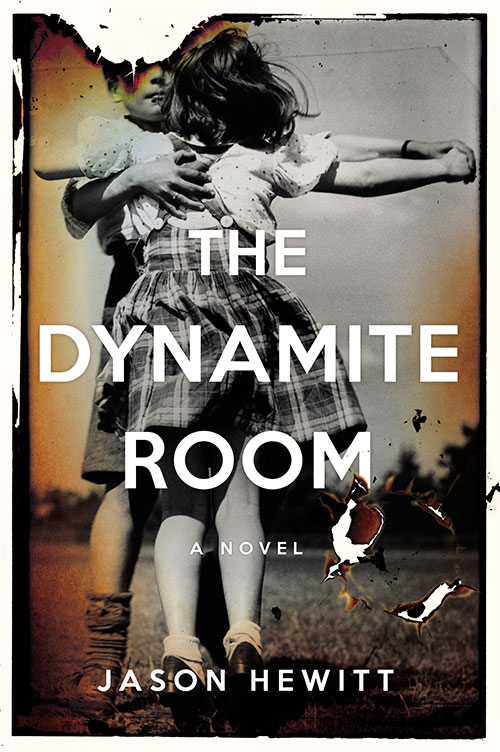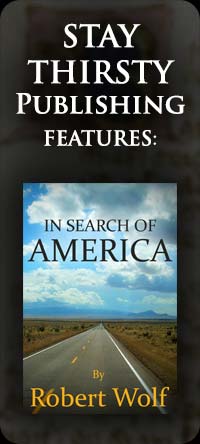

Five Questions for Novelist Jason Hewitt
By THIRSTY
Jason Hewitt's debut novel, The Dynamite Room, was longlisted for the Desmond Elliot Prize for New Writing (2014) and for the Authors' Club Best First Novel Award (2015). It was shortlisted for the New Angle Prize for Literature (2015). There is a buzz building about this new literary talent. Born in Oxford, UK, he is a graduate of the University of Winchester and has an M.A. with Distinction in Creative Writing from Bath Spa University. He currently lives in London and his second novel, Devastation Road, will be published in late July 2015. Stay Thirsty Magazine has named Jason Hewitt our THIRSTY RISING STAR for the Summer 2015 issue because he is a very talented young writer to keep an eye on as his career unfolds.
STAY THIRSTY: Your debut novel, The Dynamite Room, received a very positive reception. Why did you decide to write an intense, psychological drama between an eleven-year-old girl and a wounded German soldier?
JASON HEWITT: Actually it wasn't as much a strategic decision than more a case of the story finding me. I have a History degree and a natural affinity to research, and had already decided that I wanted to write a historical novel set during World War II, but one with a difference – the sort of war novel that I had always wanted to read but had never been able to find. I was particularly interested in shrinking the global war down to a domestic setting and pitting two characters from the opposing sides against each other. In extreme situations, such as war, the most unlikely relationships are formed and I wanted to investigate how, in a confined space, two trapped characters might affect each other, how their relationship might evolve.

Jason Hewitt (credit: Sam Conway)
My wounded German soldier came to me first. By chance, in a library, I had come across some reports that during the summer of 1940 – when England was under the threat of invasion – German bodies were occasionally washed up on the beaches of south east England, either from Luftwaffe planes shot down over the English Channel or torpedoed U-boats; and of one particular beach where discarded German food was found that showed no sign of having just been washed up on the tide (the chocolate was dry, not tampered by the sea, and looked like it had just been taken freshly out of a bag). The fear amongst the locals was that another German body had been washed up, except that this time the enemy was not drowned but very much alive, and now loose in the Suffolk countryside. This instantly sowed the seed of an idea. What if a German had really landed? What if he had taken shelter somewhere? What if somebody else was already hiding there? And who, from a dramatic point of view, would be the most unlikely person for him to be "trapped" with? From this final question eleven-year-old Lydia was born.
Furthermore, focusing on only two main characters allowed me the time and space to really put them under the microscope, to slowly unpack their issues, and give them the depths and complexities that I might not have space for otherwise in a more populated novel. Making Lydia eleven years old also created a more interesting dynamic between them. If my German soldier had been holed up with an adult woman the readers' expectations for the story would have been very different and the plot much more predictable.
STAY THIRSTY: Why do British readers still respond so strongly to World War II stories even though seventy years have elapsed since that war ended? Will that hold true for European and American readers too?
JASON HEWITT: The thirst in Britain for stories set during World War II certainly seems unquenchable and I can't see any sign of this waning. The fact is that, in England at least, anyone living at the time was profoundly affected by the war. No one was left untouched by it. It changed everyone. That provides any writer with an endless vat of stories. What's more, the war also brought enormous economic and political change, seismic shifts in every strata of society, and huge scientific and technical advances. In no other time has so much human upheaval cast such a shadow over us, and this holds endless appeal to writers and readers alike.
Of course every European nation takes a different view on the war depending on their experience. That said, they all produce and continue to produce an ever-growing canon of literature about the war and I don't think this will change. If anything, I suspect it will become even more diverse. Over recent years, for example, many German writers have become considerably more open about the war and the actions of their forebears, producing a new crop of German war fiction that is surprisingly brave and honest.

Similarly, when I was writing The Dynamite Room I was keen to provide a balanced view. My German soldier might be the enemy, and you might consider him a thug, a murderer, a thief and liar. However, I also hope that readers find some sympathy for him. He is as much a victim of the war as Lydia is, or any of the other characters. War reshapes all of us, for better or worse, and this is an intrinsic message that threads throughout the story.
American readers may well feel a little more detached from events. The US was never under the threat of invasion. It didn't suffer the endless blackouts, the rationing, the bombing of its cities, or the mass murder of its civilians, as happened in Europe, yet the families of the 292,000 US soldiers killed in the conflict still paid a heavy price. Other, more recent, wars may seem to hold more relevance to modern readers today but still nothing captures the global imagination like the events of the Second World War.
Furthermore, as we enter a new phase in its history – losing the last of the men and women that were involved in the fighting – it becomes, in my opinion, even more important that we don't lose sight of its significance, its lessons and its warnings; and I believe war literature plays a vital role in keeping the memory of it alive, if only to remind us never to let it happen again.
STAY THIRSTY: In The Dynamite Room you explore the themes of loneliness, fear, hope and shame amidst a claustrophobic setting. What messages were you sending with this book? Why is claustrophobia such an important element in your work?
JASON HEWITT: I'm never actually aware of any potential themes when I'm working on a novel. It's only after it's finished and has been allowed to simmer that I think, Oh yes, that's what it's about! All I knew initially with The Dynamite Room was that I wanted to keep my readers on their toes – never knowing who out of the two main characters will take the upper hand, who is the most vulnerable, who has the most secrets or the most to lose. It proved a difficult balancing act but I wanted readers to eventually see the characters as two sides of the same coin. For this reason identity is a key theme but, as you say, fear, loneliness, hope and shame also play an important role. I think a further reason, for example, that war fiction still resonates so strongly with readers is that the extremity of World War II hugely magnifies (to great dramatic effect) emotions that we all relate to on a lesser everyday degree. We may fear, for example, losing a parent or child, but only in the extremity of World War II did people justifiably fear losing not just a child but potentially every family member they had. With characters pushed to such deep psychological limits war fiction inevitably creates some of the most exhilarating and emotionally charged drama.
By staging the majority of The Dynamite Room in the dark, hot confines of a boarded-up house the setting acts as a pressure-cooker. The atmosphere is instantly tense, and when you add the two opposing forces of Lydia and my German it also provides (I hope) the perfect set-up for a taut psychological drama. The house, Greyfriars, I always considered as my third protagonist. It is a large Edwardian house on the edge of the Suffolk marshlands (think of the opening scenes of Charles Dickens' Great Expectations, minus all the mist), and is very much a haunted house, although not in a traditional way.
Claustrophobic settings have always appealed to me because they force you to focus solely on the characters and how they interact. Under the microscope the minutiae of what each of them does takes on greater significance, not only for the readers, but for the other characters too. There is an intimacy that inevitably forms and yet ultimately they remain strangers, trust can be quickly gained and broken again, secrets can be held from each other, lies are easily dispensed. And ultimately, if put under enough pressure or left to stew for long enough, any masks will start to slip. The Dynamite Room is a war novel with very few bombs and blasts. Instead much of the drama comes from what the characters; all the secrets, forgotten memories, truths and fears that they bring to Greyfriars concealed, at first, in their heads.

STAY THIRSTY: Your second novel, Devastation Road, will be released in July 2015. You have chosen the historical backdrop of war again, but in this story you focus more on the significance of belonging and of memory. You also bring together again the relationship between an adult and a child. What in your life informs you about crafting stories like these? Are you establishing strategic interchanges between types of people that we will see in the years to come and that will become hallmarks of your body of writing?
JASON HEWITT: I should probably start by saying that I don't have a US publisher for Devastation Road yet and so at the moment it will only publish in the UK and Commonwealth. That said, I feel that it's a natural progression from The Dynamite Room so I'm hopeful that it will reach a US readership very soon. Whilst my debut is tight and claustrophobic, Devastation Road is expansive and probably the closest I'll ever get to writing a road movie. Yet, like The Dynamite Room, it seeks to casts a new light on the war, this time focusing on those few days around the declaration of peace in Europe, a period that is usually ignored by other novelists.
With Devastation Road my fascination with memory comes to the forefront, particularly the idea that memories ultimately form us, and that if they are ever lost we lose sight of who we are. The novel opens with a man waking in a field not knowing where he is or what has happened to him. As he tries to make his way home across the war-scarred remnants of Europe he is also trying to recover his memory and to piece together the story of his war and what he has done.
At its heart lies the relationship between him and a Czech adolescent called Janek. As in The Dynamite Room these two characters find themselves thrown together, although this time on the same side, and, despite barely being able to speak the same language, they form an unlikely alliance. I find unusual pairings intrinsically more interesting to write about than marriages and ordinary families, or everyday friendships. Even the relationships between smaller characters – such as Lydia's brother, Alfie, and his best friend, Eddie – often have a twist. I wonder whether it's because I don't live a very conventional life myself – no children, no wife, no home that I own. (I am still renting). I don't even own a car.
As to whether these strategic interchanges between characters will form a common thread in my writing, well, I don't know, but I can't see myself ever writing a straightforward love story. I wouldn't know where to start.
STAY THIRSTY: In addition to being a novelist, you have written a play that was produced and appeared as an actor in a variety of roles. In which art form are you the most comfortable? If you had to choose only one vehicle of expression, which would it be?
JASON HEWITT: Ultimately I'm a writer. I have been ever since I picked up my first pencil or crayon. And if no one wanted to publish another book by me, if everyone stopped reading them, I'd still write anyway – I wouldn't know what else to do. The acting and playwriting have been very welcome additions to my life and initially when I got my first publishing deal I foolishly envisaged that I might be able to keep all three things spinning. As it is though, the novel writing (and all the promotional work around it) takes up so much time that there's little room for much else. That said, I'd love to set foot on the stage again at some point and have plans to write a new play before throwing myself into the hungry mouth of another novel. In the meantime, I treat any public reading as a theatrical performance so if you happen to come to one and can hear strange scales, trills and arpeggios coming from the wings it's probably just me warming up the old vocal cords.
Link:





